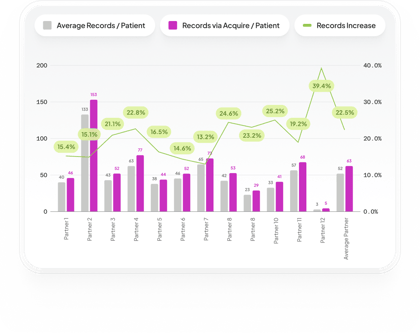From ChatGPT to the Complete Digital Medical Record

Despite the technological advances of the past two decades, managing medical records remains outdated and inefficient. In the U.S., more than 9 billion pages of medical records are still faxed every year, and medical record management costs American healthcare $125 billion annually.
At Credo, we are committed to radically simplifying and automating the medical record retrieval and analysis process to support risk adjustment, reduce healthcare costs, and improve outcomes.
The Current Medical Record Framework
The current medical record framework has made significant strides in healthcare by creating interoperability standards. The Trusted Exchange Framework and Common Agreement (TEFCA) has established a common set of principles, terms, and conditions that organizations must adhere to, in order to share patient health data securely and efficiently.
However, interoperability alone cannot solve the problem of medical record analysis. Once a provider receives a patient's historical records, they still face the challenge of reviewing those records and extracting vital information, such as diagnostic codes.
At Credo, we’ve found that a patient's medical history, on average, is made up of over 40 documents which can contain hundreds or even thousands of pages. In one test with a provider group in New Jersey, a request through our digital channels for 270 patients returned over 31,000 medical records.
As you can see, with this much data coming back, providers will need a tool that generates a succinct and accurate summary of a patient’s records, enabling them to walk into a patient encounter with a comprehensive understanding of the individual’s medical history.
Analyzing Medical Records with Large Language Models
To improve medical record analysis, we must leverage all available technological advancements. At Credo, we've seen promising results from training a machine learning model to work alongside human coders to identify HCC codes. Even without domain-specific training, GPT-4 achieves 89.7% accuracy, with expected improvement through time and reinforcement training.
This technology plays a crucial role in Credo PreDX, the first-of-its-kind pre-encounter patient summary solution. Credo PreDX uses large language models to automate the discovery of diagnostic codes and identification of gaps in care within a patient’s medical records.
We pair this technology with human coders who can add, remove, or modify ICD-10 codes as needed. Credo PreDx empowers at-risk providers to perform pre-encounter risk adjustment, increasing their accuracy and compliance while also providing them with the information necessary to deliver the highest quality of care.
We believe every patient deserves a complete and accurate medical history, and we’re confident that AI and machine learning will play a key role in achieving this goal. If you’re interested in trying out Credo PreDX — we’ll retrieve and analyze records for 20 patients free of charge — please fill out this form to get in touch.
Back to blog




